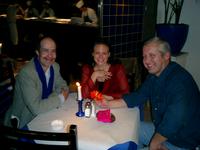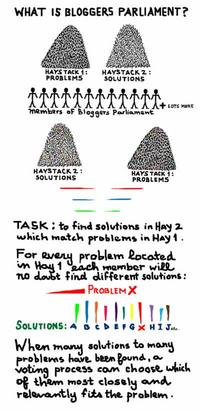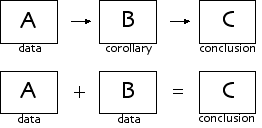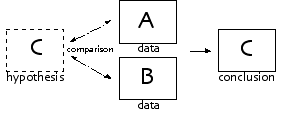|
This is my dynamic, frequently updated homepage. This is a NewsLog, also known as a WebLog or Blog.
Everything is evolving, so don't assume too much.
People to watch:
Adina Levin
Andrius Kulikauskas
Britt Blaser
Catherine Austin Fitts
Chris Corrigan
Clay Shirky
Dan Gillmor
Dave Pollard
David Allen
David Weinberger
Dewayne Mikkelson
Dina Mehta
Doc Searls
Elisabet Sahtouris
Elizabeth Lawley
Euan Semple
Florian Brody
Frank Patrick
Gen Kenai
George Dafermos
George Por
Graham Hancock
Greg Elin
Hazel Henderson
Heiner Benking
Inspector Lohman
Jean Houston
Jerry Michalski
Jim McGee
Jim Moore
John Abbe
John Perry Barlow
John Robb
Joi Ito
Jon Husband
Jon Lebkowsky
Jon Udell
Jonathan Peterson
Judith Meskill
Julian Elvé
Julie Solheim
Kevin Marks
Lawrence Lessig
Leif Smith
Letecia Layson
Lilia Efimova
Lisa Rein
Marc Canter
Mark Oeltjenbruns
Mark Pilgrim
Mark Woods
Martin Dugage
Martin Roell
Mary Forest
Matt Mower
Max Sandor
Michael Fagan
Mike Owens
Mikel Maron
Mitch Kapor
Mitch Ratcliffe
Nathalie dArbeloff
Netron
Noam Chomsky
Paul Hughes
Peter Kaminski
Phil Wolff
Philippe Beaudoin
Ray Ozzie
Raymond Powers
Rebecca Blood
Roger Eaton
Roland Tanglao
Ross Mayfield
Scott Lemon
Sebastian Fiedler
Sebastien Paquet
Skip Lancaster
Spike Hall
Steven Johnson
Stuart Henshall
Thomas Burg
Thomas Madsen-Mygdal
Thomas Nicholls
Timothy Wilken
Todd Suomela
Tom Atlee
Tom Munnecke
Tom Tomorrow
Ton Zijlstra
Lionel Bruel
Loic Le Meur
Nancy White
Mark Frazier
Merlin Silk
Robert Paterson
Colby Stuart
Nova Spivack
Dan Brickley
Ariane Kiss
Vanessa Miemis
Bernd Nurnberger
Sites to watch:
Edge
Junto
Absara
Rhizome
Nanodot
HeadMap
Openworld
FutureHi
Imaginify
Do No Harm
BoingBoing
Smart Mobs
Webcamorama
MetaFilter
NotThisBody
Disinfopedia
YES Magazine
Collective Web
WorldChanging
Disinformation
Escape Velocity
Space Collective
Friendly Favors
Emergent by Design
Independent Media
Global Ideas Bank
Forbidden Science
Greater Democracy
ThoughtsOnThinking
Disclosure Project
Explorers Foundation
Manufacturing Dissent
Collective Intelligence
Action without borders
Free Expression Network
Co-intelligence Institute
Electronic Frontier Foundation
French:
Emmanuelle
Manur
Elanceur
Loeil de Mouche
IokanaaN
Blog d'Or
Le Petit Calepin
GeeBlog
Absara
Guillaume Beuvelot
Ming Chau
Serge Levan
Jean Michel Billaut
C'est pas Mécanique

I live in Toulouse, France where the time now is:
01:06
Unique Readers:

Primarily
Public Domain
Everything I've written here is dedicated to the
Public Domain.

The quotes from other people's writings, and the pictures used might or might not be copyrighted, but are considered fair use. Thus, overall, this weblog could best be described as being:
Primarily Public Domain. |
Syndication:
 ![Validate my RSS feed [Valid RSS]](http://www.newciv.org/pic/valid-rss.png)
|
| Tuesday, November 25, 2003 |  |
|
|
|
 Scotty posts the delightful story of Wu-Ming, a simple Buddhist monk who seemed to demonstrate great wisdom without particularly trying. In the words of Tung-Wang, 898 A.D.: Scotty posts the delightful story of Wu-Ming, a simple Buddhist monk who seemed to demonstrate great wisdom without particularly trying. In the words of Tung-Wang, 898 A.D.:"Though in the course of my lifetime I have encountered many of the most venerable progenitors of the Tathagata's teaching, never have I met one so skilled at awakening others to their intrinsic Buddhahood as this wonderful fool Wu-ming. His spiritual non-sequiturs were as sparks, lighting the flame of illuminating wisdom in the minds of many who engaged him in dialogue.
Once a monk approached Wu-ming and asked in all earnestness, "In the whole universe, what is it that is most wonderful?" Without hesitation Wu-ming stuck a cucumber before the monks face and exclaimed, "There is nothing more wonderful than this!" At that the monk crashed through the dualism of subject and object, "The whole universe is pickled cucumber; a pickled cucumber is the whole universe!" Wu-ming simply chuckled and said, "Stop talking nonsense. A cucumber is a cucumber; the whole universe is the whole universe. What could be more obvious?" The monk, penetrating the perfect phenomenal manifestation of Absolute Truth, clapped his hands and laughed, saying, "Throughout infinite space, everything is deliciously sour!"
On another occasion a monk asked Wu-ming, "The Third Patriarch said, "The Great Way is without difficulty, just cease having preferences." How can you then delight in eating cucumbers, yet refuse to even take one bit of a carrot?" Wu-ming said, "I love cucumbers; I hate carrots!" The monk lurched back as though struck by a thunderbolt. Then laughing and sobbing and dancing about he exclaimed, "Liking cucumbers and hating carrots is without difficulty, just cease preferring the Great Way!"" Ah, life is so simple, if we just stay true to our nature, do what comes natural, and avoid getting lost in abstract complexities.
[ Inspiration | 2003-11-25 05:46 | | PermaLink ] More >
|
|
|
|
 Mentioned by Bushman and others. Go watch The Meatrix. A fabulous little flash movie where Moopheus will show you the real world. First of all it is a very funny and perfectly done takeoff of The Matrix. Secondly, it introduces the issue of the destructiveness of factory farming in meat production, and presents activist resources and alternatives. Thirdly, the movie is a "Free Range Flash Activism Grant". I.e. a design company called Free Range Graphics invited non-profit organizations to apply for the production of a free Flash movie. Not only is that very nice of them, and a powerful tool for activism, but it is of course also an excellent promotion for their company. Something to learn from there. Win-win and support the common good. Mentioned by Bushman and others. Go watch The Meatrix. A fabulous little flash movie where Moopheus will show you the real world. First of all it is a very funny and perfectly done takeoff of The Matrix. Secondly, it introduces the issue of the destructiveness of factory farming in meat production, and presents activist resources and alternatives. Thirdly, the movie is a "Free Range Flash Activism Grant". I.e. a design company called Free Range Graphics invited non-profit organizations to apply for the production of a free Flash movie. Not only is that very nice of them, and a powerful tool for activism, but it is of course also an excellent promotion for their company. Something to learn from there. Win-win and support the common good.
[ Inspiration | 2003-11-25 05:46 | | PermaLink ] More >
|
|
| Monday, November 24, 2003 |  |
|
|
|
 Excellent op-ed piece "Tech Bloom in full flower" by Alex Steffen. Excellent op-ed piece "Tech Bloom in full flower" by Alex Steffen."The conventional wisdom, during the Tech Boom, was that what drove innovation was the lure of giant piles of cash. That idea now rubs shoulders with the Berlin Wall. What makes creative people tingle are interesting problems, the chance to impress their friends and caffeine. Freed from the pursuit of paper millions, geeks are doing what geeks, by nature, really want to be doing: making cool stuff.
Not just making it, but giving it away. Saying the Tech Bloom is not commercially driven is like saying Mother Teresa had an interest in the poor.
Which may be why the media haven't quite gotten the magnitude of what's happening here: It's not about investments. If the Tech Boom had a graven image, it was the bull on Wall Street. The Tech Bloom is more likely to be found dancing around the desert at Burning Man, the annual festival where money is taboo, everything's a gift and creative participation is synonymous with cool." Indeed, it is great news. Very cool things are being developed by people who do it because it needs to be done, because it is fun, because other people like it. Money has very little to do with it. It is unstoppable. Imagine when the whole world works like that.
[ Inspiration | 2003-11-24 05:20 | | PermaLink ] More >
|
|
|
|
Chandler is an open source project envisioned and spearheaded by Mitch Kapor. A very ambitious and well-funded effort, working on bunch of things that really need doing. At the very first glance it might seem like nothing special, just another e-mail, calendar, to-do list kind of program. But it the way it aims and doing things, and how shared it will be that is interesting. See Roger's overview of places to learn more. Like this Compelling Vision.With Chandler, users will be able to organize diverse kinds of information for their own convenience -- not the computer's convenience. Chandler will have a rich ability not only to associate and interconnect items, but also to gather and collect related items in a single place creating a context sensitive "view" of many types of data, mixing-and-matching email, mailing lists, instant messages, appointments, contacts, tasks, free-form notes, blogs, web pages, documents, spreadsheets, slide shows, bookmarks, photos, MP3's, and so on (and on). Data in Chandler is stored on repositories on the user's local machine, on others' machines, and on shared resources such as servers.
This is a very different approach from that of today's common PIMs. For example, users can usually only view a given email message in one specific folder, grouped only with other email messages. In the user-centric world of Chandler, the basis of the ‘relatedness’ of items is completely at the users discretion and is merely facilitated, rather than imposed by the software.
Chandler lets the user keep track of lots of concurrent, ongoing activities. Managing activity extending over time requires the ability to collect just the right sets of related items. Too much information and the user the can't find what's relevant. Too little information and the needed item goes missing. This ability to gather relevant information from disparate sources is at the heart of Chandler's design. A Chandler user could, for example, relate a variety of emails, contacts, documents, and calendar events into an ad-hoc collection related to a specific project.
Chandler will provide unified search over all of the user's information, both on her own personal computer(s) and stored in other Chandler repositories across the network. It will allow searches to be saved for re-use.
Chandler will give non-programming users the ability to customize and extend the program in all sorts of ways, for instance, providing ways to automatically manage complex, asynchronous tasks like organizing a meeting and to automatically respond to events as they arise. I've known for a long time that this is what I would want. Seems obvious. And I've made a few attempts of programming pieces of that, that I've never finished. Nobody else seems to be doing it right. But I bet Chandler will go where it intends to go.
[ Technology | 2003-11-24 05:37 | 0 comments | PermaLink ]
|
|
|
|
 My friend from L.A. Roger Eaton is on a quest. Nothing less than the software that would enable the voice of humanity to be articulated. The wiring that might allow us to pool our thoughts and have our collective mind express what we think and feel and what we want to do. So we can then better take action and set our world straight. Not exactly an easy project, but somebody needs to do it. My friend from L.A. Roger Eaton is on a quest. Nothing less than the software that would enable the voice of humanity to be articulated. The wiring that might allow us to pool our thoughts and have our collective mind express what we think and feel and what we want to do. So we can then better take action and set our world straight. Not exactly an easy project, but somebody needs to do it.
Luckily there are many other individuals and groups and projects and tools that fit in with that, and which one way another works towards it. Nobody can do it alone. Roger is now methodically going through what is out there that might relate, and providing good overviews and analysis of what he finds. Read about it in his blog
[ Technology | 2003-11-24 05:55 | | PermaLink ] More >
|
|
|
|
I'm having a little bit of a conflict with myself. See, I believe that the philosophy and practice behind open source software is one of the most powerful and hopeful potentials in the world. Individuals, small teams, large networks doing good things and sharing the results. For a variety of reasons like: it needed to be done; it is fun; other people think you're cool; knowing it is the best way to do things; or just to scratch one's personal itch. The point is that money and greed has relatively little to do with it. But monetary rewards might very well follow from this approach. It all makes sense that the best way of being valuable, and being considered valuable in the world, is to get something useful into as many hands as possible, and making as few barriers as possible to further creativity and improvement.
And, now, one of the roles I've most often played is that of a programmer. I've written a lot of code, a lot of software, some of which has been very useful to others. I've written chat rooms, bulletin boards, calendars, task managers, weblogs, member databases, mailing list managers, website authoring programs, shopping carts, content managers, image manipulation, DNS administration, server monitoring, and probably much more I'm forgetting.
But I've never made a program open source. I.e. I've never created a page that you could download a program from, with installation instructions and documentation. And I've never made any meaningful way for others to contribute to the programs I created. Why not? Well, in part it might be that I still have the remainder of a belief that I somehow would be more likely to be paid if I kept the software close to my chest. Despite that a lot of this was given away freely to use on my server. But, even more, it is probably that I'm a perfectionist and my projects are usually a little too ambitious. Meaning, they were never quite finished to my own satisfaction, so I didn't feel they were ready for prime time. And I had usually made some shortcuts that meant that the programs worked alright when they stayed on my server, and when I could fix any problems that popped up. It takes some additional effort to make software solid and generic enough that somebody can just download it and use it in a somewhat different environment, maybe in ways I hadn't foreseen.
Most successful open source projects start off by doing one relatively limited thing fairly well. They might grow from there, sometimes tremendously, but they usually start by providing a small amount of well-defined functions. I know that very well. But still, I usually end up trying to include everything and the kitchen sink in my plan, so that even if I do something relatively limited, it has hooks into a bigger master plan, which I usually never quite finish. And therefore the individual pieces might not be easy to give away.
I'm considering changing my mind, and picking one of my projects as something I can make limited and solid enough that I can actually export it to other people. Best candidate right now seems to be a program I wrote to easily create databases, which automatically come with online forms submission, admin area, searches, group e-mailing etc. I wrote it first when I noticed that many of the little website database jobs I got were boringly similar. There are some forms on a website people can submit stuff at, and then we keep it in a database, which we need to manage in an admin area, and we might want to send e-mails to people who signed up, etc. That can easily be a few days of work each time. Where really it could be done in 1/2 hour if you didn't have to re-do the same repetitive work.
[ Programming | 2003-11-24 07:57 | | PermaLink ] More >
|
|
| Saturday, November 22, 2003 |  |
|
|
|
 Anthony Robbins says: Anthony Robbins says:The truth of the matter is that there's nothing you can't accomplish if:
(1) You clearly decide what it is that you're absolutely committed to achieving,
(2) You're willing to take massive action,
(3) You notice what's working or not, and
(4) You continue to change your approach until you achieve what you want, using whatever life gives you along the way." And I agree with him. If you become aware of what you're called to do, and you truly want to do it, and you commit all your energy to it, and you do the things that work, and not the things that don't work, and you don't give up - nothing can stop you. And, of course, if you waver on what you want, and you don't really go for it, and you insist on doing things the same old way - then you might or might not get anywhere that you like.
[ Inspiration | 2003-11-22 02:28 | | PermaLink ] More >
|
|
|
|
 Diebold is a U.S. company that makes electronic voting systems. It has been having a few problems recently hiding what it really is doing. Diebold is a U.S. company that makes electronic voting systems. It has been having a few problems recently hiding what it really is doing.
First it should raise a few red flags that the company is owned and run by Republicans who are ardent and active supporters of the Republican party and George Bush. The head of the company said recently a fund-raiser in Ohio that he is "committed to helping Ohio deliver its electoral votes to the president next year". Well, he really is, and the best way he has of doing that is that they use his voting machines.
A key point in the plan is the concept of black box voting. Essentially it means that there's a computer that spits out the results of the vote and it keeps no record of how the result was added up and who voted what. Everything is nice and anonymous, and the process is supposedly inaccessible from the outside world.
Then somebody incidentally found Diebold's source code on one of their ftp servers. And John Hopkins university went and did a thorough security analysis of it. Read more here. In brief, it is alarmingly full of security holes and very badly written in the first place. And, worse, it seems like it deliberately has many possible security features turned off.
There's a lot more. See a timeline here. According to the blackbox voting concept, the tabulating computers should add up voting results on their own, without contact to the outside world. But then good stuff like this is noticed:September 3, 2003. A file from Diebold software examined by activist J. March seems to be from a real election, and it contains real votes. This file is from the 2002 primary election in San Luis Obispo, California - SLOanalyze. This file was saved as a “backup file” at exactly 3:31 p.m. on election day (March 5, 2002), about five hours before the polls closed. This file contains a tabulation taken from 57 precincts. The votes in the file correspond with the final vote tally, which can be found on the San Luis Obispo County web site for that election (but only about 40 percent of the votes had come in by 3:31 in the afternoon). This file appears to be problematic for Diebold, because it is illegal to count the votes before the polls close. Furthermore, it raises the question of how the votes went from 57 polling places into a central tally in the middle of the afternoon. Yeah, that's a little problematic, that they have a modem link in to the voting machines, and that they're adding up the results prematurely. Eh, maybe to be able to make a few adjustments if things aren't going in the right direction?
Then somebody managed to get hold of a lot of internal memos from Diebold. A mixture of great stuff like:"I need some answers! Our department is being audited by the County. I have been waiting for someone to give me an explanation as to why Precinct 216 gave Al Gore a minus 16022 when it was uploaded. Will someone please explain this so that I have the information to give the auditor instead of standing here "looking dumb".” Mostly the memos just show that the company is a big mess and routinely will fake demos and make things look right even though they aren't.
When all these juicy details came to light, Diebold moved legally to block anybody from posting anything about it. With some success initially. But they're now being met with general civil dis-obedience as it gets posted anyway.
Most recently, presidential candidate Dennis Kucinich has had the guts to post the very same memos on his website.
Anyway, just keep this in mind the next time you vote and the results look a bit funny.
[ Politics | 2003-11-22 16:19 | | PermaLink ] More >
|
|
| Friday, November 21, 2003 |  |
|
|
|
 WorldChanging is a splendid new weblog by Alexis Steffen, Jamais Cascio, and other contributors. Its motto is "Another world is here". Lots of good, positive material. WorldChanging is a splendid new weblog by Alexis Steffen, Jamais Cascio, and other contributors. Its motto is "Another world is here". Lots of good, positive material.
[ Information | 2003-11-21 15:15 | | PermaLink ] More >
|
|
|
|
 Nano technology progresses on various fronts. Nano technology progresses on various fronts.
According to New Scientist, Israeli researchers have succeeded in getting DNA to assemble nano-scale transistors. In other words, biology used to create self-assembling electronic devices. Still way to go before it can be useful, but it is the first successful demonstraton of that kind.
And, according to SpaceDaily, Russian scientists have made a device that should be able to produce large amounts of nanotubes. Carbon nanotubes is the strongest material currently in existence. It is a key component of plans to create space elevators. E.g. cables from the earth to geo-stationary orbit, allowing you to take an elevator into orbit. Or, better yet, cables from the earth to the moon.
[ Science | 2003-11-21 15:15 | | PermaLink ] More >
|
|
|
|
There's something really infuriating about companies that build their business on (mis-)using some existing laws to screw everybody but themselves. Well, the good part of it is that it exposes bad laws, and makes loads of people want to change them, but in the short term such companies will often get away with it.
Prime areas for legal, but anti-social, perverted and criminal business opportunities are in the fields of patents and copyrights. If you play your cards well, it is better business than dealing drugs, because the courts will protect you, and you don't need to produce anything valuable at all. You just need lawyers who will work for percentages.
The MPAA (movie companies' association) and RIAA (record labels' association) are continuously busy with that kind of activities. Instead of figuring out how to evolve their business towards what people want nowadays, they try to protect their old business by threatening and extorting and suing people. And they keep large volumes of perfectly useful movies out of circulation, just because they own them and don't know how to make money with them.
Several software related companies that are failing in having a real business have adopted an approach of extorting other companies. A company called SCO, which bought key pieces of UNIX from Novell, attracted investors based on a plan of extorting money from UNIX licensees and Linux users. It is an incoherent and wacky plan which probably won't work, but they're trying hard, having spent $10 million just in laywer's fees to attack other companies. More here and here.
Lots of questionable legal activity springs up around bogus patents. E.g. Altnet is a company that made a business off of creating spyware to infiltrate your computer. They now bought a patent which supposedly would allow them to extort money off of peer2peer networks. And the patent itself is a trivial technique they had no part of creating in the first place. Read about it here.
Why do I call them "criminal"? My definition of criminal isn't about whether it is legal or not, but rather that you're bereaving others of the real value of their work and creativity and amassing value for yourself that you didn't create. Nowhere is that quite as obvious as when it comes to the "ownership" of ideas.
[ Information | 2003-11-21 15:15 | | PermaLink ] More >
|
|
|
|
From the site of the British-American Coalition Against WarMarketing:How do you actively promote starting a war, when most people want peace? How do you convince the peaceful majority of a nation's populace that unprovoked aggression is rational? How can you sell death and destruction, in the name of peace? This is the systematic practice of WarMarketing.
Definition: WarMarketing -- Promoting fear, uncertainty and doubt (FUD), by spin-doctoring known false information with the deliberate intent to justify otherwise irrational acts of aggression. The skillful productization of premeditated acts of mass-violence that is inflicted upon many innocent people, with the ulterior motive to license "officially approved" personal financial gain for a few guilty people.
Definition: WarMarketer -- One who enables a warmonger to package, position and promote the plan to stir up war. One who conceives of and evolves the deceptive re-branding of the government entity previously known as the "War Department," into the more palatable "Department of Defense." Indeed. These days it is vital to become an expert in double-speak, propaganda and Weapons of Mass-Deception, so that you can notice when somebody's fucking with your mind, and take evasive action.
[ Knowledge | 2003-11-21 16:11 | | PermaLink ] More >
|
|
| Monday, November 17, 2003 |  |
|
|
|
  I spent a couple of days traveling and meeting people. London and Munich. In London, a couple of very pleasant blogger meetings. Julie took the train in from Glastonbury and we met first with Julian Elvé and Dina Mehta, who was passing through from India. And then with Euan Semple later. Delightful conversations, and good as always to meet people in the flesh that you've only known virtually beforehand. And when it is through blogs, one can usually hit the ground running, as we already know a lot about each other. I spent a couple of days traveling and meeting people. London and Munich. In London, a couple of very pleasant blogger meetings. Julie took the train in from Glastonbury and we met first with Julian Elvé and Dina Mehta, who was passing through from India. And then with Euan Semple later. Delightful conversations, and good as always to meet people in the flesh that you've only known virtually beforehand. And when it is through blogs, one can usually hit the ground running, as we already know a lot about each other.
[ Diary | 2003-11-17 11:34 | | PermaLink ] More >
|
|
|
|
 A new friend from Moscow mentioned to me that my Transformational Processing books are out in their third printing in Russian. And that she's run into many psychologists who're raving about them. Which is fabulous of course. But it is also a little strange in that I didn't at all know they were reprinted. I might have made too casual an agreement with the translator who's representing them on my behalf. But, regardless, the key point for me is that they get into the hands of people who can benefit from them, and not necessarily that I make money from it, although it would be nice. It is also a little strange to be more famous somewhere where I don't understand the language, rather than anywhere where I do. Anyway, after a little searching I managed to find the publisher's site. It is in Russian, but a run through an automatic translator reveals that it in part says something approximately like this: A new friend from Moscow mentioned to me that my Transformational Processing books are out in their third printing in Russian. And that she's run into many psychologists who're raving about them. Which is fabulous of course. But it is also a little strange in that I didn't at all know they were reprinted. I might have made too casual an agreement with the translator who's representing them on my behalf. But, regardless, the key point for me is that they get into the hands of people who can benefit from them, and not necessarily that I make money from it, although it would be nice. It is also a little strange to be more famous somewhere where I don't understand the language, rather than anywhere where I do. Anyway, after a little searching I managed to find the publisher's site. It is in Russian, but a run through an automatic translator reveals that it in part says something approximately like this:"In the book by simple and accessible language are thoroughly revealed the principles, technology and the practice of psychological consultation. Its author, being based on the rich practical experience, proposes to the attention of the readers the effective and flexible system of psychological aid, which absorbed into himself the newest achievements in this region. With the aid of this book it is possible not only to be introduced to the theory of psychological consultation, but also to study it in practice, using the proposed exercises; and also to become acquainted with the philosophical bases of the described approaches and technician.
Because of the consistency of construction and the living metaphorical style of the author, this book will interest professionals in psychological consultation, and all those, who are interested in personal development, psychological aid to itself and their close one. In the formulation of the book the figures of the author are used." Not a perfect translation, obviously, but it gives the idea. ".. the living metaphorical style of the author" - heheh, I like that. And the fact that I can write "simple and accessible" Russian. Apparently you can buy the first book here. 343 rubels.
I'm wondering if I should maybe change my mind and pursue getting them published in English. I never really thought that would be appropriate, as they're in the format of instruction manuals, and I really imagined a rather limited audience for them.
[ Processing | 2003-11-17 12:26 | | PermaLink ] More >
|
|
|
|
Below is an open letter from Vietnam vet Stan Goff to GIs in Iraq. It arrived in my e-mail today. A powerful, touching and sad message."They told us that we were in Vietnam to make sure everyone there could vote.
What they didn't tell me was that before I got there in 1970, the American armed forces had been burning villages, killing livestock, poisoning farmlands and forests, killing civilians for sport, bombing whole villages, and committing rapes and massacres, and the people who were grieving and raging over that weren't in a position to figure out the difference between me 'just in country' and the people who had done those things to them.
What they didn't tell you is that over a million and a half Iraqis died between 1991 and 2003 from malnutrition, medical neglect, and bad sanitation. Over half a million of those who died were the weakest: the children, especially very young children.
My son who is over there now has a baby. We visit with our grandson every chance we get. He is eleven months old now. Lots of you have children, so you know how easy it is to really love them, and love them so hard you just know your entire world would collapse if anything happened to them. Iraqis feel that way about their babies, too. And they are not going to forget that the United States government was largely responsible for the deaths of half a million kids. ..."
[ Politics | 2003-11-17 14:02 | | PermaLink ] More >
|
|
| Monday, November 10, 2003 |  |
|
|
|
 My friend Lionel suggested I'd probably like Giordano Bruno, who's a now relatively little known Italian renaissance philosopher from the 16th century. At least I had never heard of him, but he's been very famous or infamous in various periods. My friend Lionel suggested I'd probably like Giordano Bruno, who's a now relatively little known Italian renaissance philosopher from the 16th century. At least I had never heard of him, but he's been very famous or infamous in various periods.
And, indeed, I like him. Here's a good overview of what he was about: The Forgotten Philosopher, which I'll include at the bottom too. He was apparently quite a bit ahead of his time, a pioneer semanticist and epistemologist.
He wrote, for example, about the "shadows of ideas", about how ideas and words are always imprecise approximations of something more real. Like Korzybski centuries later, he took up battle against Aristotelian thinking that makes everything much too black and white."This entire globe, this star, not being subject to death, and dissolution and annihilation being impossible anywhere in Nature, from time to time renews itself by changing and altering all its parts. There is no absolute up or down, as Aristotle taught; no absolute position in space; but the position of a body is relative to that of other bodies. Everywhere there is incessant relative change in position throughout the universe, and the observer is always at the center of things." He dreamt about an infinite universe with an infinite number of inhabited worlds, united in a single interpenetrating unity. A place where God and Nature couldn't possibly be considered separate entities."The universe comprises all being in a totality; for nothing that exists is outside or beyond infinite being, as the latter has no outside or beyond." And he defended loudly the right to think about such things, to dream, to question reality, search for one's own answers, and to philosophize about what it all means. Which is summarized in the slogan he coined:"Libertes philosophica" Here is a list of his writings.
Giordano was a major non-conformist thinker of his time. Which of course didn't sit well with the Catholic church. So, somebody inevitably turned him in to the Inquisition, which failed to make him recant in the slightest, and as a dangerous heretic he was eventually burned at the stake in 1600, as a martyr for free thinking and universal unity.
[ Inspiration | 2003-11-10 15:59 | | PermaLink ] More >
|
|
|
|
MIT Technology Review has introduced an experiment and game called "Innovation Futures". It is like a stock market where one can bet on the futures of all sorts of events, and you can buy and sell contracts. The events are real, but the money is not. However, the people who're most successful in the game will win some nice prices.
This is rather intriguing. Might something like this possibly be meaningful as a democratic mechanism? You know, if the game will reveal how much faith we have in various future scenarios, and who's the best at predicting which scenarios actually come to pass - does that not translate into something we can use to organize society by? Wouldn't the best leaders by those who are most in synch with public sentiments? I'm not sure if there's a correlation. After all, the 'real' stock market will rather reward those who can predict public mis-conceptions and profit from them, without much regard to the final outcomes.
[ Information | 2003-11-10 16:43 | | PermaLink ] More >
|
|
|
|
COUGAAR is an "Open Source Cognitive Agent Architecture for Large-Scale Distributed Multi-Agent Systems". Wow, that sounds neat. From that site:"Cougaar is a Java-based architecture for the construction of large-scale distributed agent-based applications. It is a product of two consecutive, multi-year DARPA research programs into large-scale agent systems spanning eight years of effort. The first program conclusively demonstrated the feasibility of using advanced agent-based technology to conduct rapid, large scale, distributed logistics planning and replanning. The second program is developing information technologies to enhance the survivability of these distributed agent-based systems operating in extremely chaotic environments. The resultant architecture, Cougaar, provides developers with a framework to implement large-scale distributed agent applications with minimal consideration for the underlying architecture and infrastructure. The Cougaar architecture uses the latest in agent-oriented component-based design and has a long list of powerful features." Sounds good. I'm very interested in self-organizing agents, and this is open source. Can I use it for anything? There are some documents. The architectural overview seems to be in clear enough language. I can't quite grasp if this only makes sense for a large logistical planning operation. Like if I'm going to invade Syria and I want the right number of M1 tanks to show up in the right place at the right time, despite that they, and various other pieces of hardware they depend on, come from a variety of different places, and I suddenly change my mind while the tanks are on their way, and btw some of them got blown up on the way, and so did some of the computers keeping track of this, but I want it all to work anyway. Is a similar framework meaningful for a more peaceful grassroots purpose? Such as the distributed storage of good information. Or collaborative planning of events or projects amongst diverse collections of organizations.
[ Programming | 2003-11-10 17:37 | 0 comments | PermaLink ]
|
|
| Sunday, November 9, 2003 |  |
|
|
|
 Jason Salavon has done a little research project consisting of digital aggregation of playboy centerfolds. Specifically he averaged all the pictures for each decade. And you can see some kind of evolution over time ... I suppose. Like that the girls were pink in the 60s and orange in the 70s. Really you can't see much. I hope that he didn't get a research grant for this. Anyway, here to the right is my favorite, Miss 1980s. She looks sort of vaguely familiar somehow. Jason Salavon has done a little research project consisting of digital aggregation of playboy centerfolds. Specifically he averaged all the pictures for each decade. And you can see some kind of evolution over time ... I suppose. Like that the girls were pink in the 60s and orange in the 70s. Really you can't see much. I hope that he didn't get a research grant for this. Anyway, here to the right is my favorite, Miss 1980s. She looks sort of vaguely familiar somehow.
[ Inspiration | 2003-11-09 15:25 | | PermaLink ] More >
|
|
|
|
 Natalie d'Arbeloff (see also her alter ego Blaugustine's Blog) has started the Blogger's Parliament. And what is that? Natalie d'Arbeloff (see also her alter ego Blaugustine's Blog) has started the Blogger's Parliament. And what is that?"A flexible assembly of bloggers who are interested in finding and selecting from the blogosphere or from any other source - including their own thoughts - feasible solutions to current problems in the world. Members of Bloggers Parliament can be thought of as talent scouts, finding those elusive needles - solutions which can get right to the point of a problem - in the daunting haystack of information.
This is not a chat room, discussion forum, soap-box or fund-raising scheme, nor can it be used to advertise or sell any products or services. Our focus is only on the collection or creation of specific imaginative, relevant, informed, constructive and perhaps unorthodox solutions which could, if applied, really solve specific problems." So, essentially creative people post specific solutions to specific problems. And then those solutions might end up being put into the hands of people who can use them or implement them. Looks very promising sofar.
[ Organization | 2003-11-09 15:42 | | PermaLink ] More >
|
|
|
|
 Thanks a lot to you other bloggers who quoted or linked to my Budget Rent-a-Car nightmare story. It is very helpful in getting the attention of the Budget corporate office. Well, it is hard to compete with a car-rental company in a search engine on just their name, as lots of travel sites are going to be linking to them. But it appears prominently in various somewhat more obscure searches, such as Budget Sucks, budget rental problems, budget car nightmare, etc. Thanks a lot to you other bloggers who quoted or linked to my Budget Rent-a-Car nightmare story. It is very helpful in getting the attention of the Budget corporate office. Well, it is hard to compete with a car-rental company in a search engine on just their name, as lots of travel sites are going to be linking to them. But it appears prominently in various somewhat more obscure searches, such as Budget Sucks, budget rental problems, budget car nightmare, etc.
Anybody else who want to link to the article, the best link is:
http://ming.tv/flemming2.php/__show_article/_a000010-000922/
I sent a letter to the Budget CEO, which he should be getting around now, telling him where to look for my report on the net. And I included all the documentation and paperwork too of course. Hopefully they will respond.
If not, can anybody think of any other ways of getting through to them? Them being:
Cendant Car Rental Group
6 Sylvan Way
Parsippany, NJ 07054
See, Budget is really just a section of some real estate investment company. Phhftp! I really have something against companies that don't even care about what they're doing at the top, because it is just a way of making loads of money in any which way. And who's this Cendant company?
"Cendant is…
one of the foremost providers of travel and real estate services in the world;
the world’s largest hotel franchisor, the world’s largest vacation ownership organization, and one of the world’s largest car rental operators;
the world’s largest real estate brokerage franchisor, one of the largest retail mortgage originators in the U.S., and the world’s largest provider of outsourced corporate employee relocation services;
the franchisor of the second-largest tax preparation service in the U.S. and leading providers of travel information processing services worldwide. And, gasp, I'm a little disheartened. The fuckers actually own a long string of very well known travel and real estate related brands. Travelodge, Ramada Inn, Coldwell Banker, Century 21, CheapTickets, various vacation timeshare companies, and on and on and on, AND Budget AND Avis. And they are all primarily franchises. I.e. they're selling those brand names to some other people who go and do the work. All of those 'companies' seem to be headquartered in the same place in Parsippany, New Jersey. And here I go around thinking I have a choice of car rental companies and hotels and real estate agents, and then they're all owned by the same company that nobody's heard of. Except for they really aren't, because I'm just dealing with some franchisee who's trying to make money and who's bought the right to use that brand so that I can be made to believe I'm in good hands. What a big scam.
OK, Cendant just bought all those companies. They didn't necessarily invent them. Like, they only bought Budget last year. So I can't necessarily blame them. I'll write about what is wrong with the whole subject of corporations somewhere else.
But, is Cendant, who had $1.7 billion of profits last year, going to care a twit about whether a couple of their franchisees ripped me off of 3000 bucks? Probably not in the least. But they would care if I put a spot on one of their valuable brands. So that will be my plan, unless they respond in some kind of reasonable manner. I'm just a litle worried about whether there's even anybody home to respond, seeing that kind of corporate structure.
[ Diary | 2003-11-09 17:08 | | PermaLink ] More >
|
|
| Thursday, November 6, 2003 |  |
|
|
|
 I think Japanese youth culture and dress-up styles are fascinating. This is a picture of a girl in the Harajuku district of Tokyo, from here. As a tourist guide says: I think Japanese youth culture and dress-up styles are fascinating. This is a picture of a girl in the Harajuku district of Tokyo, from here. As a tourist guide says:"For youth culture Japan - "cool" and "cute"- Harajuku, just north of Shibuya, is the number one fashionable, fun, faddish, ridiculous, crazy "crib" to "chill out". Come along on a Sunday and you'll see it all!" And here's from a Japanese teen writing a paper on pop-culture:"Harajuku is weird central," says a Japanese friend of mine. Youth in Harajuku exhibit anime-style, gravity defying, Technicolor hair and wear elaborate makeup and costume-like clothing. Japanese visual rock bands are probably the greatest influence on this urban sub-cultural style. In these bands, the visual image projected by their clothes style and makeup is as important as the music they produce. Band members create onstage personas that extend far offstage. I present Japanese visual bands as an extreme of using fashion to "fabricate" an identity.
So how do these bands identify themselves? I would argue that the extremist style was developed to distinguish themselves from the mainstream music industry, largely occupied by corporate factory line, "idol school," produced singers. There is definitely shock value is this style of dress. The first thing you probably notice when looking at the photo of the band Glay, are the bands members' Technicolor, gravity-defying hairstyles. Dying hair is an obvious rejection of the Asian confine of basic black. It is symbolic of breaking out of the mold of appearing "Oriental". But more so, I think, the eye-catching hairstyles allude to anime and manga, where hair color and style often becomes a distinguishing feature of the characters."
[ Culture | 2003-11-06 04:59 | | PermaLink ] More >
|
|
|
|
 An Ethiopian fellow named Belachew Girma broke his own record in laughing non-stop. And got a crowd of unlookers to do the same. There's not always a lot to laugh about in Ethiopia, but sometimes the best therapy is to do so anyway. Story at BBC. An Ethiopian fellow named Belachew Girma broke his own record in laughing non-stop. And got a crowd of unlookers to do the same. There's not always a lot to laugh about in Ethiopia, but sometimes the best therapy is to do so anyway. Story at BBC. "We are living full of stress... Natural disasters, economical, political, social problems... My aim is to minimise this stress. Please let us communicate by smiling," he said. "Our slogan is 'laughter, love, peace for all human beings'." Indeed. The laughing exercise appears in a number of different traditions. I believe it is an old Buddhist exercise for one thing. I've participating in group laughing several times, and I can testify that it is very healing. In brief, you just start laughing, for no necessarily good reason. Sometimes that's difficult to do non-stop, but it helps to do it with a group of people. And it is kind of strange to break through the barriers that stop you from doing it. Crying works too, but I prefer the laughing process. Some people can hardly stop again. And just look at the smiling face of Belachew there. Hard not to laugh with him.
[ Inspiration | 2003-11-06 05:15 | | PermaLink ] More >
|
|
|
|
 This weekend there's a very unusual constellation happening in the sky, with, apparently, deep significances. Similar to what was called the Harmonic Convergence in 1987. Here's from Al Joy: This weekend there's a very unusual constellation happening in the sky, with, apparently, deep significances. Similar to what was called the Harmonic Convergence in 1987. Here's from Al Joy:On November 8–9 (depending on your location) a very rare and special global event will occur. Six planets and objects (Moon, Sun, Saturn, Chiron, Jupiter and Mars) will be aligned in a grand sextile or star pattern, a most unusual configuration.
Perfectly aligned for the first time in 2000 years to a Star of David configuration, these planets and objects will form a Grand Sextile of Earth and Water signs which is being called a Harmonic Concordance or the opening of the portal of Concordance (Concordance means Heart).
I believe that this celestial/astrological configuration will open a portal for a morphogenetic region of knowledge that will shift the morphogenetic patterns of all those who are exposed to it.
People will have an opportunity to be in alignment with divine knowledge and to live beyond the distorted perceptions of an evolving self whose instinctual, emotional, and physical perceptions and experiences have been overlaid by many different morphogenetic regions of knowledge on the planet.
For the last four decades, we have been experiencing strong outer planetary influences that have led to a dissolvement of our human self to merge with machines, chemicals, and devices. We have also experienced an ability to remote view and process extraterrestrial information. The complex psychological and ethereal environments that these influences have created are pushing us at speeds that we as humans can’t understand nor do we feel grounded or nurtured within. That’s because we’re having to take in and process data that is outside the realm of our physical and emotional expression. You can see the discrepancy that this creates when you compare certain parts of the globe that are still using human interaction vs. those that are using machines, chemicals, and devices to organize the world around them. By dissolving our human self, we end up removing humanism as the centerpiece of what our lives revolve around.
The Grand Sextile of Earth and Water signs that we are about to experience will awaken and bring a resurgence of female energy and passivity on the planet, balancing the male energy and reduced sense of humanism that has been dominating this time period.
The Earth and Water signs, as conduits for female energy, will allow us to integrate our physical and emotional interactions as we merge and dissolve with the radical, transforming knowledge that is being dispensed. Operating at a much slower speed, the Earth and Water signs bring structure and nurturing, giving us time to absorb and retain what is taking place around us. We could sure use that. See more here. Many synchronized ceremonies, rituals and events across the world this weekend.
[ Energy | 2003-11-06 13:59 | | PermaLink ] More >
|
|
| Tuesday, November 4, 2003 |  |
|
|
|
 A few Orwellian words about war from "1984": A few Orwellian words about war from "1984":"The war, therefore, if we judge it by the standards of previous wars, is merely an imposture. It is like the battles between certain ruminant animals whose horns are set at such an angle that they are incapable of hurting one another. But though it is unreal it is not meaningless. It eats up the surplus of consumable goods, and it helps to preserve the special mental atmosphere that a hierarchical society needs. War, it will be seen, is now a purely internal affair. In the past, the ruling groups of all countries, although they might recognize their common interest and therefore limit the destructiveness of war, did fight against one another, and the victor always plundered the vanquished. In our own day they are not fighting against one another at all. The war is waged by each ruling group against its own subjects, and the object of the war is not to make or prevent conquests of territory, but to keep the structure of society intact. The very word "war," therefore, has become misleading. It would probably be accurate to say that by becoming continuous war has ceased to exist. The peculiar pressure that it exerted on human beings between the Neolithic Age and the early twentieth century has disappeared and has been replaced by something quite different. The effect would be much the same if the three superstates, instead of fighting one another, should agree to live in perpetual peace, each inviolate within its own boundaries. For in that case each would still be a self-contained universe, freed forever from the sobering influence of external danger. A peace that was truly permanent would be the same as a permanent war. This -- although the vast majority of Party members understand it only in a shallower sense -- is the inner meaning of the Party slogan: WAR IS PEACE." George Orwell [1903-1950], whose birth name was Eric Blair, was an intense novelist and political essayist; a socialist, he fought in the Loyalist forces in the Spanish Civil War, and was a critic of totalitarianism, including Stalinism. He also foresaw the rise of our present post-post-modern bureaucratic authoritarianism.
[ Politics | 2003-11-04 11:03 | | PermaLink ] More >
|
|
| Monday, November 3, 2003 |  |
|
|
|
 There are two methods of logical reasoning that are often contrasted with each other. There are two methods of logical reasoning that are often contrasted with each other.
Here's deduction. That's when A leads to B that leads to C. Or A + B leads to C for that matter. You try to follow a logical sequence, trying to include all the facts and weeding out any variables, in order to logically prove the inevitable conclusion. Because this is true, then that must be true, and therefore we can conclude so-and-so.
These are some of the problems with deduction:
A. The human mind is badly suited for including all relevant facts. We use pattern matching to make sense out of anything, so no matter what we think is concise, comprehensive and logical, it most likely isn't.
B. The human language is not precise. Words are abstract, and different people don't mean exactly the same by them.
C. Deduction can fairly easily be manipulated by providing or revealing only those elements that will support a given conclusion.
 Then there's induction. That's where you make a mental leap and guess at the conclusion first, and then you go and check if it fits with the facts at hand. And, presumably, if you succeed in coming up with a theory that fits all the facts and hand, and that can be repeated and verified, then you've got a good answer. Or you'll find out that your hypothesis is wrong, because it doesn't explain the facts you see. Then there's induction. That's where you make a mental leap and guess at the conclusion first, and then you go and check if it fits with the facts at hand. And, presumably, if you succeed in coming up with a theory that fits all the facts and hand, and that can be repeated and verified, then you've got a good answer. Or you'll find out that your hypothesis is wrong, because it doesn't explain the facts you see.
Some of the problems with induction are:
A. The human mind is also rather badly suited for coming up with original explanations that aren't based on what previously has been fed in.
B. If one starts believing the inducted idea, there's a tendency to filter out any data that doesn't fit it, and it doesn't actually get verified.
And there's a problem with both that they're all just good guesses. You can be good at logic, and follow stringent steps of analysis and reasoning, and consistently come up with good predictions, much superior to blind, random guesses, but they're still really just qualified guesses.
Good science uses both deduction and induction. You use induction to come up with new theories that might explain more things, and you do experiments and deduct what they're showing you.
Bad science does roughly the opposite. E.g. make new theories and forget to verify them properly. Or, deduct from previous theories in order to conclude what's impossible and therefore shouldn't be explored. And rule out new theories because they don't fit with the old theories. You know, "planes can't fly because they're heavier than air", or "we won't see any extraterrestrials come here because it is impossible to travel faster than light".
Personally I like using deduction for solving puzzles, and I tend to be good at drawing the logical conclusion from data that is available. But to create my picture of the world, I much prefer to use induction. I.e. I search for, or imagine, the models that will explain more of the world I know than the models I previously used. And which I can verify by experiment in my own life, and/or which will better predict events than the alternative models. I recommend it.
But watch out for people who would like to sell you more limiting world views and explanations, based on that they have been "proven" and yours have not. The logical wires have been crossed a bit there. If you have a model or world view that allows you to successfully understand, explain and predict many things, don't buy a model that explains and predicts less, no matter what authority backs it up, or questions yours.
Astrology is a fine example there, particularly because a lot of people will think that it isn't. If you're a skilled astrologer who can probably successfully understand and explain and predict lots of things about people, you might once in a while run into an angry scientific type who insists that it is a big fraud, and you're an idiot, because nobody's found any mysterious rays from the planets that are controlling people. And he's typically implicitly inviting you to drop your large vocabulary of patterns and archetypes and relationships, and replace it with, essentially, the belief that you can't really predict anything much about people's lives and personalities, and random data and luck is about the best you can get. Is that better? If astrology actually works for you, obviously no. If it doesn't, maybe you should keep looking. Reading tea leaves is not necessarily better than checking out the available facts.
The test is of course whether it works. The most satisfying, all-encompassing, verifyable, workable, simple explanation is the better one. That it is big and complex doesn't make it better. Simpler is better. But the point is to use the model that works best for you.
 So, what about, say, religious explanations? Well, if you're actually reasoning yourself conscioiusly towards a more complete cosmology, the same rules apply. If you're accepting somebody else's explanation, you might very well be subject to the pitfalls mentioned above. I.e. you get to see exactly what you expect to see and nothing else. Specifically religious discourse seems to be fruitful ground for the circular kind of reasoning, where you logically 'prove' to yourself that the foundation for your belief is sound, simply by starting with a datum and coming back to it a little later. So, what about, say, religious explanations? Well, if you're actually reasoning yourself conscioiusly towards a more complete cosmology, the same rules apply. If you're accepting somebody else's explanation, you might very well be subject to the pitfalls mentioned above. I.e. you get to see exactly what you expect to see and nothing else. Specifically religious discourse seems to be fruitful ground for the circular kind of reasoning, where you logically 'prove' to yourself that the foundation for your belief is sound, simply by starting with a datum and coming back to it a little later.
You know, "Jesus died for MY sins, so I really owe him to listen to his words, and what he says is in the bible, so it must be true, because he said it, and it says that he died for my sins." A mix-up of what is the hypothesis and which is the data.
"Nothing can travel faster than light because we have a theory that says so, so therefore we aren't looking for it, and therefore we haven't seen anything do so, and therefore it is proven."
Evolutionists versus Creationists is probably another area where you'll find plenty of circular reasoning, where you prove your point by your own arguments.
One way or another, there isn't quite any logical panacea that you can prove everything with. Developing a useful picture of the world is done with some mixture of an open mind, your own intuition, keen observation, experimentation, luck, good advice, access to good data, verificaton of the validity of data AND some discipline of logical reasoning.
[ Patterns | 2003-11-03 13:27 | | PermaLink ] More >
|
|
|
|
I don't really understand a word of this article in Scientific American. But it seems that a reknowned theoretical physicist is suggesting that the universe is a 3-4 dimensional hologram created from a 2 dimensional array of information. In part because, surprisingly, a 2D surface can contain more information than a 3D construct, as the latter would collapse by its own mass into a black hole at some point. Which is all certainly an intriguing idea. You know, a hologram is created by shining light on a special piece of film, and a 3D picture is created. So, as to the universe, it would mean that what we see and walk around in is an illusion generated from light and information. Which of course makes it seem kind of likely that we can generate something a little or a lot different by changing the information a bit.
[ Science | 2003-11-03 13:27 | | PermaLink ] More >
|
|
|
|
A few people responded to my previous post about an EU poll of which country would be the biggest threat to world peace, and hinted that I'm anti-semitic for posting it, and for voicing an agreement with the majority opinion expressed in it. And, well, that's a rather explosive thing to even try to discuss, but I'm trying anyway.
When I grew up in Denmark, the history of the German occupation and extermination of Jews was a big part of our education. And there would be no question about that we of course were on the side of the persecuted Jews and against the Nazis.
But it was also sort of an abstract thing. I didn't really know what a Jew was. Meaning, it would be sort of a puzzle to me why Jewish people were singled out. I couldn't really see any difference between Jewish people and non-jewish people. Did they have more crooked noses, or what's the deal? And why should that be a problem? I really didn't get it. I couldn't understand how it could be a racial thing when the people percecuted didn't look any different from anybody else.
When I moved to the U.S. it became a little more clear. In part because there's a lot of racism in the U.S. Let me clarify. In California I didn't experience much racism in terms of some skin colors being considered less than others. Maybe a little bit of looking down on Mexicans, but I didn't really understand that either, as I don't perceive hispanic people as being of any different race than I am. But the kind of racism I'm talking about is kind of in reverse. There was a lot of attention put on people's races. When I filled out public forms, I'd have to check off that I was "Caucasian", whatever the hell that is supposed to mean. And everybody's very sensitive about stating that somebody's african-american or hispanic or asian-american or something. And very afraid of offending anybody. I really found it rather tasteless to always emphasize races, when I'd really much rather have that we're all just humans, which is pretty much how I see it.
And it was in the U.S. that I first met people who would identify themselves as Jewish. My boss for a number of years, whom I was very fond of, was Jewish. As was a bunch of the managers. And I went to his son's bar-mitzvah. Which was enjoyable. The ceremony in the temple was really lively and down-to-earth. In my lunch break I would frequently go and eat fallafels in an Israeli food place. Every week there was a rabbi speaking to a group of people there, telling stories from the Torah and explaining what they meant. Which I found rather enjoyable too. And all of which only gave me a pleasant feeling about the Jewish culture and religion. And then there's the Kabbalah, which is a great source of wisdom.
Certainly nothing has given me any reason to conclude that Jewish people across the board would somehow be something to be against. I haven't found anything about Jewishness not to like. And the whole idea of being anti- some particular cultural or racial group, that's very foreign to me.
At the same time I do understand that various kinds of people might carry deep-seated grudges against each other. Cultural groups that have very stronly negative opinions about each other, often based on things that happened a very long time ago, but which somehow is part of the cultural heritage. Again, I have a hard time personally identifying with that, as I don't have any personal experience to relate it with. But I realize that it is different for some people.
I still get kind of puzzled and surprised when once in a while I run into Jewish people who have very strong opinions when the subject of the Israel-Palestinian conflict comes up. Or, rather, strong opinions do not surprise me, and would be perfectly understandable. Rather when what a moment ago what was a pleasant, relaxed, well-reasoned person suddenly is somebody apparently filled with hatred and anger and vengeance. Somebody going to great lengths to convince me that I'm an idiot if I don't understand that Palestinians, as well as all Arabs, are violent, lying, criminal sub-humans who aren't to be trusted. And that Palestinians don't deserve any land to live on, because it was never theirs in the first place, and there's really no such things as "Palestinians", and it would be easier to just mow down the whole lot anyway. And if I dare to disagree, that's around the time when I get called anti-semitic, and somebody will question why I've listened so much to Arab propaganda that I can have such an outrageous opinion.
Note, I'm not trying to generalize that all Jewish people see it that way. They most certainly don't. And I'm not trying to generalize that it is a particularly Jewish thing. I'm sure there are plenty of Palestinians or Arabs who'd prefer that all Jews would be wiped off the face of earth. For some reason they just haven't crossed my path much, other than on TV. And I'm sure there are plenty other groups that feel in similar ways about each other. Yugoslavia, Rwanda, etc.
But I can say with some confidence that that attitude certainly doesn't help in creating peace anywhere. Whatever past history of transgressions it is based on.
And I can say that it is my opinion that the Israeli government is going about the matter completely wrong, and probably is guilty of many war crimes.
And, sure, most likely Arafat is a bumbling idiot and has missed several great opportunities for peace laid out in front of him.
And, sure, strapping explosives to your body and blowing up innocent people in buses and shopping centers, that's a very bad idea. As is gunship attacks on people's homes. All of it is just escalating a conflict that didn't have to exist.
I happen to think the Israeli government holds most of the cards, and that it is playing them wrong. And I suppose the people in the Israeli government are Jewish. Does that make me anti-semitic? Not any more than my opinion that George W's government is illegitimate and corrupt makes me anti-caucasian or anti-christian or anti-american.
People and governments are different things. Individual people, such as government leaders, are different things than the country or race or culture they come from.
I usually can't recognize Jewish people unless they identify themselves as such. It doesn't matter to me if you're Jewish or not. Or whether you're Muslim or not. If you are and it is important to you, great. But I don't go around looking for signs that you're in some kind of cultural or religious group that I can then have a bias for or against. If you have a unique perspective or an interesting heritage, I might very well be interested in hearing it. But as far as I'm concerned, I'm a member of humanity, and so are you.
[ Opinions | 2003-11-03 15:02 | | PermaLink ] More >
|
|
<< Newer stories Page: 1 ... 49 50 51 52 53 ... 97 Older stories >> |
|

This is a collage of things that catch my eye, things that need to be said, and stuff I really care about
TRUTH
BEAUTY
FREEDOM
LOVE
TECHNOLOGY
|
| Mon | Tue | Wed | Thu | Fri | Sat | Sun |
|---|
|
|
|
|
|
|
1 |
| 2 |
3 |
4 |
5 |
6 |
7 |
8 |
| 9 |
10 |
11 |
12 |
13 |
14 |
15 |
| 16 |
17 |
18 |
19 |
20 |
21 |
22 |
| 23 |
24 |
25 |
26 |
27 |
28 |
|
|




